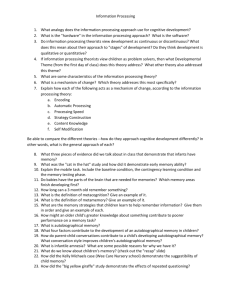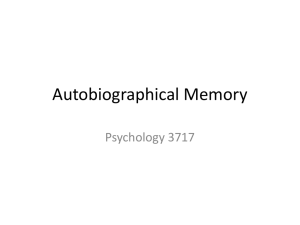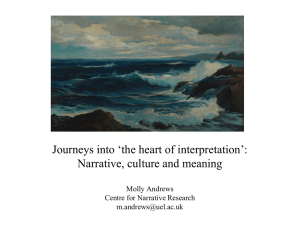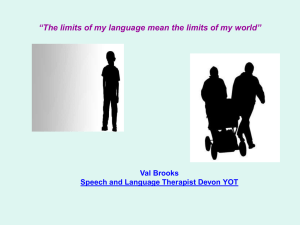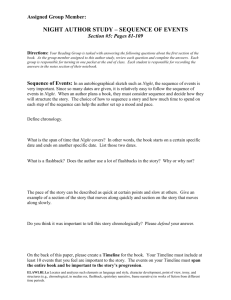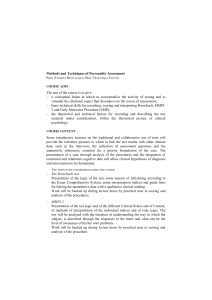de la Mata et al. ISCAR 08. Extended Summary
advertisement
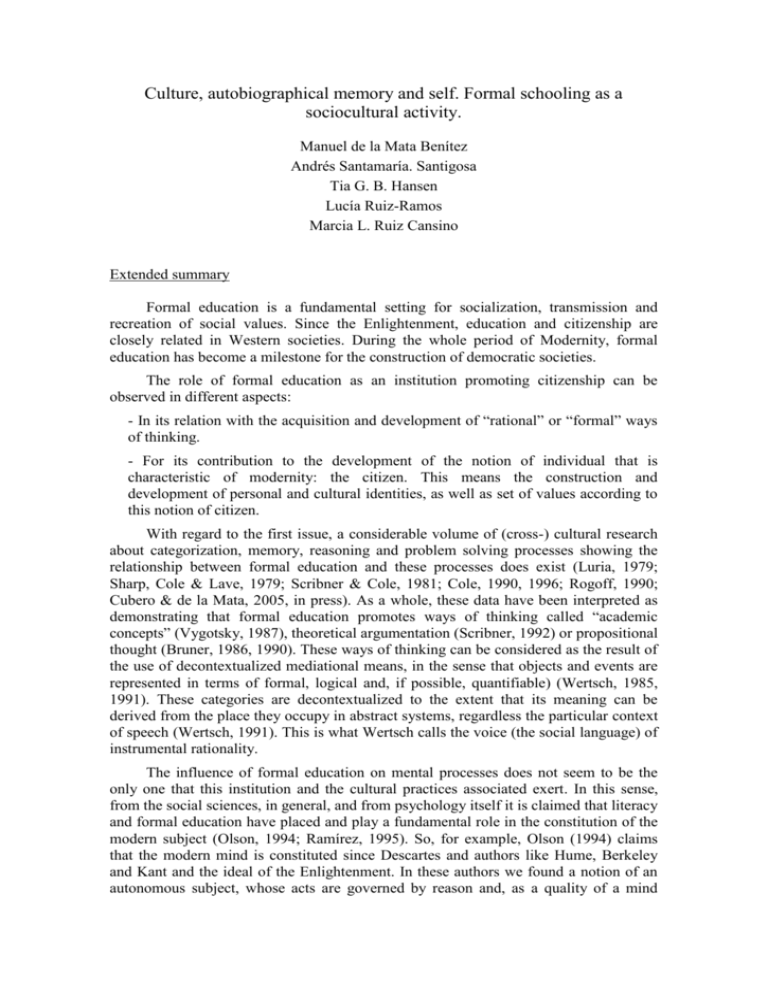
Culture, autobiographical memory and self. Formal schooling as a sociocultural activity. Manuel de la Mata Benítez Andrés Santamaría. Santigosa Tia G. B. Hansen Lucía Ruiz-Ramos Marcia L. Ruiz Cansino Extended summary Formal education is a fundamental setting for socialization, transmission and recreation of social values. Since the Enlightenment, education and citizenship are closely related in Western societies. During the whole period of Modernity, formal education has become a milestone for the construction of democratic societies. The role of formal education as an institution promoting citizenship can be observed in different aspects: - In its relation with the acquisition and development of “rational” or “formal” ways of thinking. - For its contribution to the development of the notion of individual that is characteristic of modernity: the citizen. This means the construction and development of personal and cultural identities, as well as set of values according to this notion of citizen. With regard to the first issue, a considerable volume of (cross-) cultural research about categorization, memory, reasoning and problem solving processes showing the relationship between formal education and these processes does exist (Luria, 1979; Sharp, Cole & Lave, 1979; Scribner & Cole, 1981; Cole, 1990, 1996; Rogoff, 1990; Cubero & de la Mata, 2005, in press). As a whole, these data have been interpreted as demonstrating that formal education promotes ways of thinking called “academic concepts” (Vygotsky, 1987), theoretical argumentation (Scribner, 1992) or propositional thought (Bruner, 1986, 1990). These ways of thinking can be considered as the result of the use of decontextualized mediational means, in the sense that objects and events are represented in terms of formal, logical and, if possible, quantifiable) (Wertsch, 1985, 1991). These categories are decontextualized to the extent that its meaning can be derived from the place they occupy in abstract systems, regardless the particular context of speech (Wertsch, 1991). This is what Wertsch calls the voice (the social language) of instrumental rationality. The influence of formal education on mental processes does not seem to be the only one that this institution and the cultural practices associated exert. In this sense, from the social sciences, in general, and from psychology itself it is claimed that literacy and formal education have placed and play a fundamental role in the constitution of the modern subject (Olson, 1994; Ramírez, 1995). So, for example, Olson (1994) claims that the modern mind is constituted since Descartes and authors like Hume, Berkeley and Kant and the ideal of the Enlightenment. In these authors we found a notion of an autonomous subject, whose acts are governed by reason and, as a quality of a mind populated with ideas, beliefs, desires, memories…For Olson, these notions of subject and mind are related to the cultural changes that arose in the Western world since the extension of literacy at the beginning of Modernity (linked to the Protestant Reform and the origins of capitalism). More specifically, Olson claims that literacy and literate practices permitted the separation of things and their representations, so that thinking becomes an “autonomous” activity about the world, in other words, an “epistemic” activity, and mind as an object defined by mental states Since the beginning, thus, literacy is associated to the formation of the notion of individual and citizen that is characteristic of Modernity. It is not surprising, then, the emphasis on literacy in countries and situations in which political initiatives of creation of citizenship have been developed. With regard to psychology, this issue has not received the attention that it requires, in our opinion. However, we may mention some data that we consider of interest in this respect: - Cross-cultural studies by Luria (1979) evidences the difficulties experienced by illiterate peasants from Uzbekistan to define themselves as individuals, regardless their groups of belongingness (family, village…). - Recent data from cross-cultural psychology shows differences in the construal of self characteristics of different cultures. So, for instance, Anglo-American and Northern and Central European cultures may focus on individual, demonstrating an independent self-construal. This independent self is considered as a separate and autonomous entity, defined by a unique repertoire of traits, capacities, though and feeling. Asian cultures, in contrast, tend to emphasize a collective or interdependent self, experienced as apart of a social web (Cross & Markus, 1999; Markus & Kitayama, 1991; Kagitçibasi, 1996, 2005). These differences in the emphasis on independence vs. interdependence are evidenced in diverse aspect of the self, as the experience and expression of emotions, cognitive processes, attributions and moral reasoning or achievement motivation, among others (Kagitçibasi, 1997, 2005). With respect to the above ideas, it is interesting to note the predominance of an independent self-construal in cultures from Central and Northern Europe, where the Protestant Reform took place. In these cultures, a greater development of literate culture has been observed. However, the links between these two questions are to be elaborated both theoretically and empirically.. - Studies developed in our country by members of our research group show the existence of a relationship between formal education and some aspects of cultural identities (Macías, Marco & García, 2005), attitudes and values (Cala, 1999) and gender identities (Cala & de la Mata, 2006). In general, we may state that these studies show the use of different identification acts that posses an argumentative and rhetoric character depending on the educational level of the individuals. People with more schooling experience use more decontextualized semiotic tools and forms of argumentation based on establishing general relations between classes of objects. The forms of identification of the people with a short schooling experience are usually supported on narratives of concrete everyday experiences. These narratives are referred to the speaker or acquaintances (Cala, 1999). These results have been interpreted in terms of the relationship between formal education and the discourse modes that characterize instrumental rationality. Anyway, although the effects of formal education on cognitive processes (memory, categorization, and reasoning and problem-solving) are relatively well established in (cross-)cultural research, and despite the data mentioned above, we think that it is necessary to investigate this issues further. Autobiographical memory is defined as memory for the facts and events of personal meaningful past (Conway, 1990; Rubin, 1986; Rubin, 1999; Conway & Pleydell-Pearce, 2000; Nelson, 2003). Autobiographical memory is related to the self, and to the experience of personhood, that is, to the experience of enduring as an individual, in a culture, over time. In fact, self and autobiographical memory construct each other, as, on the one hand, personal memories are cognitively organized around the and, on the other hand, the self cannot exist as a continuous across time without the existence of personal memories organized in subjective time. We may say that autobiographical memory allows us be in time. Both elements, self and autobiographical memory constitute each other by means of a third element that is present since the very beginning: narrative. Thus, we assume that autobiographical memory can be conceived as self-making narrative (Bruner, 1990, 2003; McAdams, 2003), a narrative in which individual’s life is reconstructed. Therefore, narrative can be considered the raw material (or, rather, the tools) that permit the existence of a memory that is more than a mere collection of isolated facts and events, on the one hand, and of a self (perceived as) continuous and coherent. It is, in sum, a discursive construction that is mediated, as any narrative, by semiotic tools that the individual appropriates across his/her life. (Santamaría & Martínez, 2005). The appropriation of semiotic tools is related to the participation in different socio-cultural settings. These semiotic tools are taken from the social discourses that people is exposed to (values, gender roles and stereotypes…) and from the discourses of relatives and acquaintances (the transactions with significant others). Research in the last years has evidenced cultural differences in autobiographical memory (Wang & Brockmeier, 2002; Leitchman, Wang & Pillemer, 2003; Nelson & Fivush, 2004, Fivush & Nelson, 2006). These differences are consistent with differences observed in self construal between cultures (Leichtman, Wang & Pillemer, 2003). Observed differences concern to different aspects, like the age at the first memories the length and the elaboration (including emotions), the content (in relation to autonomy and connectedness) and the characters (self and other) involved. To explain these differences, several mechanisms of cultural influence have been proposed (Leitchman, Wang & Pillemer, 2003): - Narrative environment.. Differences in topic and style in adult-child conversations have been found. These differences influence the nature of autobiographical memories (Fivush, Haden & Reese, 2006; Fivush, 2007). - Self-construal (Wang, 2001a). Differences in the degree in which culture promotes an independent vs. interdependent (Markus & Kitayama, 1991) or enhance autonomy vs. relatedness (Kagitçibasi, 1996, 2005; Keller, 2007; Keller et al., 2004) influence the way in which individuals in these cultures remember their lives. - Emotion situation knowledge. (Wang, 2003; Wang & Fivush, 2005). Different cultures differ in their understanding of emotions, especially in the consideration of what emotions are appropriate for each situation. In this sense, the emotional meaning assigned to an event affects to all memory processes: - Beliefs about the personal past. Different value systems associated with cultural orientations towards independence vs. interdependence (and other cultural orientations) gives rise to differences in the beliefs and meaning about the personal past. These differences influence individuals’ willingness and facility to remember autobiographical events and the way of doing it (Leicthman et al., 2003). The number of studies about the relationship between autobiographical memory and culture is, however, limited. In general, they have focused on American and Asian (Chinese, Korean, Japanese) cultures. There are no studies with Mediterranean, LatinAmerican, Muslim or East European cultures. Cultural differences in autobiographical memory and self overlap with gender differences in both processes. In this field, most researchers have found a higher tendency to interdependence and connection in women than in men. The predominant way in which men see themselves stress personal achievement and independence (Chodorow, 1989). These differences are observed in a variety of cultures (Costa, Terracciano & McCrae, 2001) and are consistent with the data from studies comparing women and men in autobiographical memory. Women’s memories are usually earlier and evidence a richer and more complex emotional content than men’s. In this sense, two narrative styles are employed by mothers and fathers when they interact with their sons and daughters and co-construct past events (more or less elaborative) (Fivush, Haden & Reese, 2006; Fivush, 2007). An important factor for explaining the differences between males and females in autobiographical memory is the different forms of socialization for boys and girls (Davis, 1999). A special emphasis is put on the socialization of emotions, given the important emotional load of autobiographical memory and the fact that differences usually appear in the cases in which the emotional dimension of narratives was taken into account. Another aspect in which differences have been found is that of the themes of autobiographical memories. In women there is a general predominance of themes associated to interpersonal relations (“communion”), while personal achievement was the predominate theme in males (Niedzwienska, 2003). On the other hand, the relationship between culture and gender is quite complex. Some studies have emphasized the need to study in depth the way in which these two factors interact in people from different cultures (Hayne & Macdonald, 2003). In a previous study about autobiographical memory, self and culture (de la Mata et al., 2008), we have analyzed the earliest memory and self descriptions of college students from Denmark, Spain and Mexico. Although there are not many studies about self construal in these countries, it is assumed that the Danish culture is characterized by a relatively high level of individualism, the Mexican culture by a higher level of collectivism, while the Spanish culture can be considered to be in an intermediate level (Hofstede, 1984, 2003). In this study, a replication of Wang’s methodology and categories of analysis was applied. The procedure consisted of two tasks: 1) A written narrative of the earliest memory, with questions about accessibility and emotions. 2) A shortened version of the Twenty Statements Test (TST) (Kuhn & McPartland, 1954). The participants had to complete ten sentences starting by “I am”. For the analysis of the narratives of the earliest memory, issues like the age at the earliest memory, emotions, autonomous orientation, number of others…were considered. The self-descriptions were analyzed in terms of the form of description (individual, public or collective) and the forms of evaluation (positive, negative or neutral) provided. The results of this study evidenced some cultural and gender differences in autobiographical memory (AM) and self descriptions. These differences are summarized in table 1: - Cultural differences in AM: Age of the earliest memory (earlier in the Danish and Spanish students). Emotions (more emotions in Mexicans and Spaniards than in Danes). - Culture by gender interactions in AM Emotions (opposite trends in Danes and Mexicans). Specificity (different trends in Danes compared to Spaniards and Mexicans).. - Gender differences in AM (higher in women) Autonomous orientation. Prior recollections.. - Cultural differences in self-descriptions: more positive in Mexicans, more negative in Spaniards and more neutral evaluation in Danes.. Table 1. Results from de la Mata et al., 2008. In this context, there is a lack of studies analyzing the role of educational background in autobiographical memory. This analysis is pertinent and especially necessary for different reasons. On the one hand, we consider that the central role of narratives in autobiographical memory makes necessary to analyze this role. Formal education and literacy are associated to the development of narrative forms differentiated form those associated to oral discourses (i.e. primary vs. secondary orality) In this sense, for example, the findings from cross-cultural research in psychology, as well as data form psycholinguistics and sociolinguistics or educational psychology have evidenced the capital influence of formal education in the acquisition of cognitive and narrative skills and the transformations in discourse in relation to socio-educational experience. On the other hand, some authors have stated the existence of a relationship between educational background and the development of socio-cultural orientations to the self enhancing autonomy (Kagitçibasi, 1996; 2005; Keller, 2007; Keller et al., 2004). A study about the relationship between formal schooling and autobiographical memory. We have conducted a study about the relationship between autobiographical memory and formal schooling. The participants of the study were adults from two generations (30-35 and 50-55 years old) and from three different educational levels: literate (learning to read and write), basic (equivalent to primary education) and university students. They were asked to narrate orally their earliest memory, as well as another important memories from each of three periods in their life (childhood, youth and adulthood). For this study, we have nalyzed the narratives of the earliest memory, only. As the explanatory variable we have only considered educational background. Differences between generations were not considered. The aims of the study are the following: 1) To analyse the relationship between schooling experience and earliest autobiographical memories and self-narratives in Mexican people. 2) To analyse some narrative aspects (i.e. the use of action & mental verbs and metacognitive evaluations) of the earliest memories. 3) To analyse gender differences in autobiographical memories and selfnarratives. Method Participants. 60 adults (30-55 years old) coming from Ciudad Victoria, Tamaulipas, (Mexico). - Gender: 30 males and 30 females. - Schooling experience: - 20 (literacy level). Learning to read and write. - 20 (basic level). Equivalent to primary education. 20 (university level) Procedure. Oral interviews about their earliest memory were conducted. The participants were also asked to remember another three memories from different periods of their lives. For this study, only the earliest memory was analysed. The interviews were transcribed literally and analysed with a category system that considered the following aspects: AM Self • Age at the earliest memory (months) • Autonomous orientation • Memory content: - individual • Other-self ratio - social • Self description • Memory specificity: - specific - general • Emotional content Table 2. Category system employed for the first analysis (Adapted from Wang, 2001, 2004). An additional narrative analysis was applied. This analysis was based on Smorti 2….). For this analysis, the transcriptions were divided into sentence units. Each unit was coded into one of the following categories Narrative analysis • • • Action verb units Mental verb units: - Cognitive - Intentional - Emotional Metacognitive units Table 3. Category system for the narrative analysis (adapted from Smorti, 2004). Results In this section, we present a summary of the main findings of our study. Analysis of Variance (ANOVA) and Chi square tests were applied. The explanatory variable was educational level. Outcome (response) variables were the categories of AM, self and narrative units. We present the main differences observed. Statistical data are omitted - Differences in three categories of AM between schooling levels were observed (age at the earliest memory, memory content and memory specificity. Only one category showed no significant differences: emotionality of the memories. In these categories, university participants’ memories were earlier, more personal/individual and more specific than the other participants’ memories. - Gender differences in autonomous and social self-orientation were also observed. Men showed a higher index of autonomy and women a higher level of social orientation in their memories. - Differences in self-description related to schooling level and gender were found. University participants (men and women) showed a higher index of agentivity than the other participants; men showed more agentive self descriptions in their personal narratives. Narrative analyses - Differences in the use of mental states (both cognitive and emotional) verbs and metacognitive units between schooling levels. Participants with higher levels of schooling used more mental verbs and metacognitive expressions in their earliest memories. - Differences in the proportion of units referred to the self between schooling levels: participants with higher levels of schooling used more sentences referred to the self. - Gender differences in the proportion of units referred to the self: higher in men than in women. Discussion and preliminary conclusions - Differences between schooling levels were similar to cultural differences associated to independent vs. interdependent self-construal (Leitchman, Wang & Pillemer, 2003;; Wang, 2001, 2004; Nelson & Fivush, 2004; Keller, 2007; de la Mata et al., 2008 - Narrative analysis showed evidence of the relationship between schooling experience and the reference to mental states in autobiographical narratives - In general, these results point to the need to deepen the analysis of the relationship between formal schooling, AM and self construal. As we have said before, more detailed analyses of the ways by which school practices influence autobiographical memory and self are needed. - Finally, we mist recognize some limitations in our study due to sample size (data assessment and analysis not completed yet). Analyses of larger samples may serve to test these preliminary results. References Bruner, J. (1986). Actual minds, possible worlds. Cambridge, MA: Harvard University Press. Bruner, J. (1990). Acts of Meaning. Cambridge , Mass. : Harvard University Press Bruner, J.S. (2003). Self-making narratives. In R. Fivush & C.A. Haden (eds.), Autobiographical memory and the construction of a narrative self. Developmental and cultural perspectives. (pp. 209-225) Mahwah, N.J.: Lawrence Erlbaum Associates. Cala, M.J. (1999) Género educación y actitudes: una aproximación retórica al estudio de los modos de discurso. Tesis Doctoral sin publicar Universidad de Sevilla. Chodorow, N. (1989). Feminist and psychoanalytic theory. New Haven: Yale University Press. Cole, M. (1990). Cognitive development and formal schooling: the evidence from cross-cultural research. In L.C. Moll (ed.): Vygotsky and Education. Instructional implications and applications of sociohistorical psychology. Cambridge: Cambridge University Press. Cole, M. (1996). Cultural Psychology: A once and future discipline. Cambridge, Mass. Cambridge University Press. Conway, M. (1990). Autobiographical memory: An introduction. Milton Keynes: Open University Press. Conway, M. & Pleydell-Pearce, C.W. (2000) The construction of autobiographical memory in the self-memory system. Psychological Review, 107, 2, 261-288. Costa, P. T., Terracciano, A. y McCrae, R. (2001). Gender Differences in Personality Traits Across Cultures: Robust and Surprising Findings. Journal of Personality and Social Psychology, 81, 322-331. Cross, S. E., & Markus, H. R. (1999). The cultural constitution of personality. In L.A. Pervin & O.P. John (eds.), Handbook of personality: Theory and research. New York: The Guilford Press. Cubero, M. & de la Mata, M.L. (2005) Requisitos teóricos y metodológicos para la creación de una Psicología Cultural. Revista Latina de Pensamiento y Lenguaje, 13 (1), 67-83. Davis, P. (1999). Gender differences in autobiographical memory for childhood emotional experiences. Journal of Personality and Social Psychology, 76, 3, 498510. De la Mata, M.; Hansen, T.G.B.; Santamaría, A, & Ruiz, L. (2008). Cultural and gender differences in autobiographical memories and self-descriptions: A narrative analysis. Paper presented at the XX Biennal Meeting of the ISSBD, Würzburg, Germany, July 13th-17th. Fivush, R. (2007) ‘Maternal Reminiscing Style and Children´s Developing Understanding of Self and Emotion’, Clinical. Social Work Journal 35 (1): 37-46 Fivush, R.; Haden, C.A. & Reese, E. (2006). Elaborating on elaborations: Role of maternal reminiscing style on cognitive and socioemotional development. Child Development, 77, 6, 1568-1588. Fivush, R. & Nelson, K. (2006). Parent-child reminiscing locates the self in the past. British Journal of Developmental Psychology, 24, 235-251. Hofstede, G. (1984). Culture’s consequences: International differences in work related values. Beverly Hills: Sage Hofstede, G. (2003). Kagitçibasi, C.(1996). Familiy and human development across cultures: a view from the other side. Hillsdale, N.J.: L.E.A. Kagitçibasi, C.(2005). Autonomy and relatedness in cultural context. Implications for self and family. Journal of Cross-Cultural Psychology, 36, 4, 403-422. Keller, H. (2007). Children development across cultures. New York: L.E.A. Keller, H.; Yovsi, R.; Borke, J.; Kärtner, J.; Jensen, H. & Papaligoura, Z. (2004). Developmental consequences of early parenting experiences: self-recognition and self-regulation in three cultural communities. Child Development, 75, 6, 1745-1760. Kuhn, M.H. & McPartland, T.S. (1954).An empirical investigation of self-attitudes. American Sociological Review, 19, 68-76. Leitchman, M.D.; Wang, Q. & Pillemer, D.B. (2003). Cultural variations in interdependence and autobiographical memory: Lessons from Korea, China, India and the United States. In R. Fivush & C.A. Haden (eds.), Autobiographical memory and the construction of a narrative self. Developmental and cultural perspectives. (pp. 73-97) Mahwah, N.J.: Lawrence Erlbaum Associates. Luria, A. R. (1979). Los procesos cognitivos. Análisis sociohistórico. Barcelona: Fontanella. Markus, H.R. & Kitayama, S. (1991). Culture and the self: Implications for Cognition, Emotion, and Motivation. Psychological Review, 98, 2, 224-253. McAdams, D.P. (2003). Identity and the life story. In R. Fivush & C.A. Haden (eds.), Autobiographical memory and the construction of a narrative self. Developmental and cultural perspectives. (pp. 187-207) Mahwah, N.J.: Lawrence Erlbaum Associates. Nelson, K. (2003). Narrative and self, myth and memory: Emergence of the cultural self. In R. Fivush y C.A. Haden (eds.), Autobiographical memory and the construction of a narrative self. Developmental and cultural perspectives. (pp. 3-25) Mahwah, N.J.: Lawrence Erlbaum Associates. Nelson, K. & Fivush, R. (2004). The emergence of autobiographical memory: A social cultural developmental theory. Psychological Review, 111, 2, 486-511. Niedzwienska, A. (2003). Gender differences in vivid memories. Sex Roles, 49, 321-331 Olson, D. (1994). The world on paper. Cambridge: Cambridge University Press. Ramírez, J.D. (1995) Usos de la palabra y sus tecnologías. Buenos Aires: Miño y Dávila. Rogoff, B. (1990). Apprenticeship in thinking. Cambridge, Mass.: Cambridge University Press. Rubin, D.C. (1986) (ed). Autobiographical memory. Cambridge: Cambridge University Press. Santamaría, A. & Martínez, MA. (2005) La construcción del significado en el marco de una psicología cultural: el pensamiento narrativo. In M. Cubero & J.D. Ramírez (ed.) Vygotski en la psicología contemporánea. Buenos Aires: Miño y Dávila. Scribner, S. & Cole, M. (1981). The psychology of literacy. Cambridge, Mass.: H.U.P. Sharp, D., Cole, M. & Lave, C. (1979). Education and cognitive development: The evidence from experimental research. Monographs of the Society for Research in Child Development, 44 (1-2 Serial nº 178). Smorti, A. (2004). Narrative strategies among early adolescents involved in bullyvictim relationships. Journal of School Violence, 4(1), 5-27 Wang, Q. (2001). Culture effects on adult’s earliest childhood recollection and selfdescription: Implications for the relation between memory and the self. Journal of Personality and Social Psychology, 81, 2, 220-233. Wang, Q. (2003). Emotion situation knowledge in American and Chinese preschool children and adults. Cognition & Emotion, 17, 5, 725-746. Wang, Q. & Brockmeier, J. (2002). Autobiographical remembering as cultural practice: understanding the interplay between memory, self and culture. Culture & Psychology, 8, 1, 45-64. Wang, Q. & Fivush, R. (2005). Mother-child conversations of emotionally salient events: exploring the functions of emotional reminiscing in European-American and Chinese families. Social Development, 14, 3, (473-495). Wertsch, J.V. (1985). Vygotsky and the social formation of mind. Cambridge, Mass.: Harvard University Press. Wertsch, J.V. (1991). Voices of the mind. Cambridge, MA: Harvard University Press. First author’s affiliation and address: Manuel de la Mata Benítez mluis@us.es Universidad de Sevilla C/ S. Fernando, 4 C.P. 41004-Sevilla Spain.
